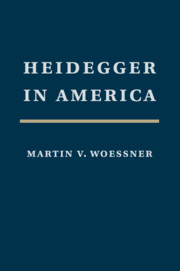Book contents
- Frontmatter
- Contents
- Preface
- Introduction: Being Here
- 1 Freiburg Bound
- 2 Exiles and Emissaries
- 3 Nihilism, Nothingness, and God
- 4 An Officer and a Philosopher
- 5 Dasein and das Man
- 6 The Continental Divide
- 7 Richard Rorty and the Riddle of the Book that Never Was
- 8 Ethics, Technology, and Memory
- 9 Culture Wars
- Conclusion: Being There
- Index
- References
7 - Richard Rorty and the Riddle of the Book that Never Was
Published online by Cambridge University Press: 04 February 2011
- Frontmatter
- Contents
- Preface
- Introduction: Being Here
- 1 Freiburg Bound
- 2 Exiles and Emissaries
- 3 Nihilism, Nothingness, and God
- 4 An Officer and a Philosopher
- 5 Dasein and das Man
- 6 The Continental Divide
- 7 Richard Rorty and the Riddle of the Book that Never Was
- 8 Ethics, Technology, and Memory
- 9 Culture Wars
- Conclusion: Being There
- Index
- References
Summary
I have spent 40 years looking for a coherent and convincing way of formulating my worries about what, if anything, philosophy is good for.
Richard RortyRichard Rorty led a fascinating philosophical life. As his intellectual biographer Neil Gross has shown, he stood at the center of the American philosophical profession's most strident debates throughout the last quarter of the twentieth century and the first part of the twenty-first. As somebody who allied himself with, in the words of Gross, “the rigorism of the analytic paradigm in the 1960s,” only to later abandon it in favor of the “anti-rigorist movement of the 1970s and 1980s,” he is the perfect case study for examining the general drift toward pluralism within recent American academic philosophy. Despite Rorty's early career-building efforts on behalf of the dominant analytic community (which Gross ably recounts), his true legacy will rest with his efforts to both broaden and deprovincialize his profession (something that Gross motions toward, but does not fully explore). Rorty did everything he could to expand the horizons of American philosophy – so much so that it may have contributed to his untimely death from pancreatic cancer in 2007. When Rorty learned of the diagnosis, he jokingly told Jürgen Habermas that, as his daughter had put it, his cancer was most likely the result of reading too much Heidegger. After all, as Rorty reminded Habermas, Jacques Derrida, another avid reader of Heidegger, died as a result of the same illness in 2004.
- Type
- Chapter
- Information
- Heidegger in America , pp. 211 - 229Publisher: Cambridge University PressPrint publication year: 2010

